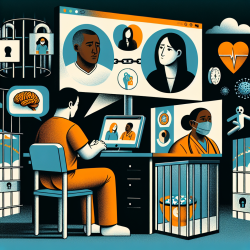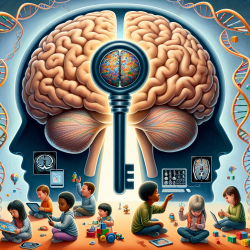The COVID-19 pandemic has forced many sectors to adapt rapidly, and mental health services are no exception. For incarcerated individuals and their families, the pandemic has presented unique challenges that telemental health (TMH) services are uniquely positioned to address. The research article "COVID-19 Inspired Relational Telemental Health Services for Incarcerated Individuals and Their Families" offers valuable insights into how TMH can improve access to mental health care and enhance family relationships during these trying times.
The Power of Telemental Health
TMH allows mental health professionals to deliver services remotely, which is especially beneficial in correctional settings where access to care is often limited. The pandemic has exacerbated these limitations, making it more critical than ever to find innovative solutions.
Benefits of TMH for Incarcerated Individuals and Their Families
The research highlights several benefits of implementing TMH in correctional facilities:
- Increased Access to Care: TMH can reach more incarcerated individuals, providing them with the mental health services they need without the logistical challenges of in-person visits.
- Cost-Effective: TMH eliminates transportation costs and can be more affordable than traditional therapy sessions.
- Improved Family Relationships: Regular virtual visits can help maintain and even strengthen family bonds, which are crucial for the mental well-being of both incarcerated individuals and their families.
Implementation Challenges
While the benefits are clear, implementing TMH in correctional settings comes with its own set of challenges:
- Technology Access: Ensuring that both incarcerated individuals and their families have access to the necessary technology can be a hurdle.
- Cost Barriers: Although TMH can be cost-effective, initial setup costs and ongoing fees can be a barrier for some families.
- Privacy Concerns: Ensuring confidentiality and privacy in a correctional setting can be challenging but is essential for effective therapy.
Ethical Considerations
Ethical considerations are paramount when implementing TMH services. Mental health professionals must adhere to guidelines that ensure confidentiality, informed consent, and appropriate use of technology. The American Association of Marriage and Family Therapy (AAMFT) provides a code of ethics that can guide practitioners in navigating these challenges.
Future Directions
The research calls for further studies to evaluate the effectiveness of TMH in correctional settings. It also recommends that mental health professionals receive specialized training to better serve incarcerated individuals and their families.In conclusion, TMH offers a promising solution to many of the challenges faced by incarcerated individuals and their families during the COVID-19 pandemic. By increasing access to care, reducing costs, and improving family relationships, TMH can play a crucial role in enhancing the mental well-being of this underserved population.To read the original research paper, please follow this link:
COVID-19 Inspired Relational Telemental Health Services for Incarcerated Individuals and Their Families.










